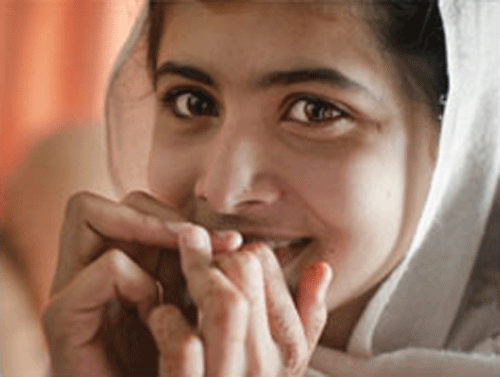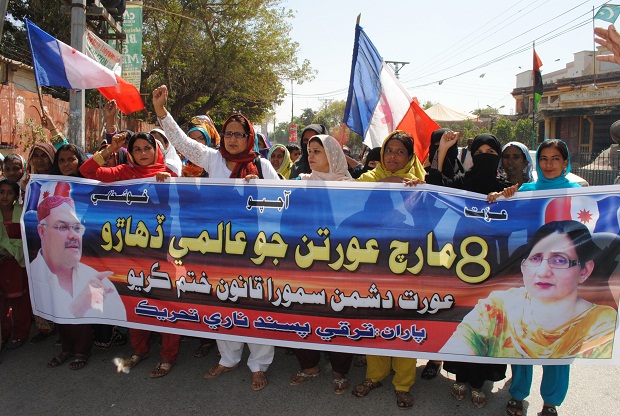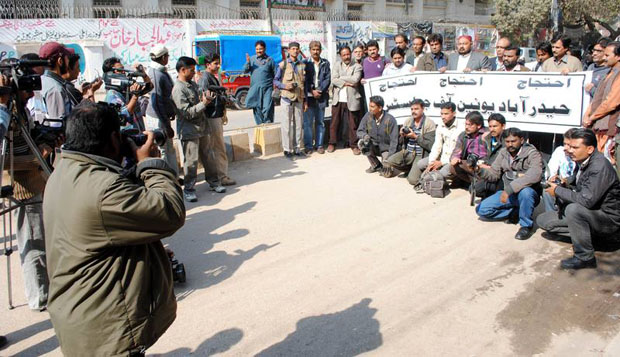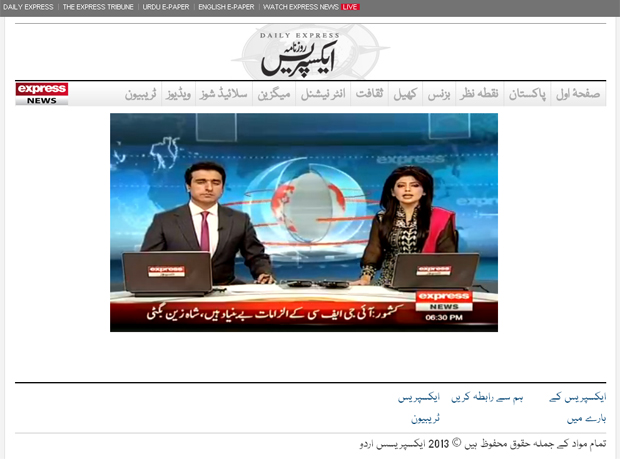30 Jan 2014 | News, Pakistan, Religion and Culture

On the morning of 28 January, the Area Study Centre, at Peshwar University in Khyber Pakhtunkhwa (KPK) province, was set to hold the launching of the book I Am Malala but called it off after the police informed its director that it would not oversee security. The author of the book, fifteen-year old Malala Yousafzai rose to fame after the Taliban attacked her in 2012 for promoting education for girls.
“We, as educationalists, can only persuade and fight militancy through ideas but we are not even allowed to do that,” said Dr Sarfaraz Khan, centre’s director. He regretted that the role of academics was being thwarted by “misled” politicians. “The state interfered in the dispensation of my duty,” he added.
Finding the whole episode “most shameful”, rights activist and academic A.H. Nayyar, said: “The city police, the university administration give a false impression that they are not scared of the Taliban but in reality they are and therefore capitulated.”
The storm began brewing the evening of 27 January when Khan received a phone call from the religious-based political party Jammat-e-Islami (JI) spokesperson, which was followed by one from the provincial information minister Shah Farman, who belongs to the Pakistan Tehreek-i-Insaf — PTI, asking him to cancel the event. The requests soon turned into intimidation.
“Educational institutions have the academic freedom and don’t need government’s permission to hold such events. More importantly, this is what we do — read, write and to celebrate books,” Khan said. “This is what I explained to the politicians and I also told them they were being misled and that they should review their undertaking.”
The pressure mounted as the night wore on with phone calls from university personnel and various government officials. But Khan refused to yield. Then he got a call from the superintendent of police telling him his force would not be able to provide security for the event. “I tried to dissuade him and even asked him if he was threatening me. He kept saying he was compelled to obey orders.”
“A simple book launch has been transformed into a major story because the government in KPK doesn’t share the progressive convictions of the ruling party’s leadership [PTI and Imran Khan],” said Islamabad-based political analyst, Mosharraf Zaidi.
By noon of January 28, after the news spread that the event — jointly staged with the Baacha Khan Trust Educational Foundation and the Strengthening Participatory Organisation — could not take place, Imran Khan tweeted: “I am at a loss 2 understand why Malala’s book launch stopped in Peshawar. PTI believes in freedom of speech/debate, not censorship of ideas.”
Zaidi said: “Imran Khan can try to distance himself from him, but nothing Farman does elicits serious reproach.”
But Dr Pervez Hoodbhoy, a physics professor and a peace activist refuses to buy the “flimsy pretext” of security to stop the book launch or spare the PTI or IK.
Terming them “Taliban’s B-team”, he said: “They have mourned the killing of terrorist leaders; forcibly stopped supplies to those fighting the Taliban; blamed every terrorist atrocity on US drones, and re-introduced violent religious material into the KPK school curricula. On the other hand, they are unmoved by the actions of their allies such as the ghastly murders of health workers, pogroms against Shias and Christians, and attacks on the army and police.”
And thus the event never happened that morning. Just as Khan was getting ready for the function, he felt very ill. The pressure had taken its toll and he was taken to the hospital where the doctors refused to release him until his condition stabilised.
By then the news had spread like wildfire and civil society and rights organisations were up in arms at the way the event had been taken hostage. At around 3pm, Khan got a call from the police saying they had made a mistake and that he could hold the event if they wished. It was too late; the harm had been done; the function had been ruined.
But there is still time to salvage PTI’s sullied reputation, Nayyar said: “It was great to see Imran Khan defy Taliban attacks on polio workers by openly administering polio drops himself, and to know that he was furious at the cancellation of the Malala book launch. We expect him to hold the book launch in Peshawar on his own and invite his friends in JI to the event!”
This article was posted on 30 January 2014 at indexoncensorship.org
24 Jan 2014 | News, Pakistan, Religion and Culture

Hindu women protest in favour of Rinkle Kumari who was forced to convert to Islam in 2012 (Image: Rajput Yasir/Demotix)
December 21 will forever be etched on the memory of Sapna and her family. Belonging to a poor Hindu family, Sapna and her older sister Sabita were teachers in a neighbourhood school in Paharipura, Peshawar, the capital city of Khyber Pakhtunkhwa province. They were the sole breadwinners for the family after their father, who worked for Radio Pakistan, retired four years ago.
On that cold wintry day Sabita stayed after school to give extra tutoring while Sapna walked home alone. During her walk a car suddenly pulled up alongside her- out jumped a man who placed a cloth doused in an unknown chemical over her face. Sapna passed out.
When she regained consciousness she found herself in unfamiliar surroundings. A man, whom she had never seen before, asked her to marry him. But first Sapna would have to convert to Islam.
On her refusal, the man placed the intoxicant-doused cloth over her nose and she fainted once again. This routine carried on for 16 days.
Sapna narrated her account of the kidnapping to the judicial magistrate earlier this month after she was rescued.
“The police traced her through a phone call she made to us asking us to rescue her,” Ramesh Kumar, her brother-in-law told Index on Censorship during a phone interview. He, along with his wife, Sapna’s older sister, had accompanied the police and found her in a village in Bahawalpur, in Punjab province some 680 km from Peshawar.
“Unfortunately, the person who kidnapped her, Zahid Nawaz, got a tip-off and escaped,” said Kumar. Nawaz wasn’t a complete stranger to Sapna. Kumar believes that his sister’s kidnapper had managed to ensnare Sapna by calling her a few times before the snatching took place.
“When he learnt that she was a Hindu, he told her that he didn’t have a sister and looked on her as one,” he added.
Despite being the first case of its kind in the area Sapna’s kidnapping has spread fear among the Hindu community in Peshawar- since the day her sister was abducted Sabita has not been allowed to step out of her house.
However, the kidnapping of Hindu girls is nothing new in other parts of the country. According to Ramesh Kumar Vankwani, head of the Pakistan Hindu Council and a legislator: “We hear of three to four such cases every month from Sindh [province].”
More worrisome to the independent Human Rights Commission of Pakistan (HRCP) is the forced coercion of these Hindu girls to Islam before marriage takes place. The majority of these cases have been reported in the Sindh area with the HRCP calling it one of the “most outrageous human rights violations one has to deal with.”
I.A. Rehman, of the HRCP, blamed both the state and society for the escalation: “Both are getting more and more caught in the frenzy of religiosity, a process accelerated by the increase in Al-Qaeda/Taliban/Salafi influence on Pakistan’s Muslims.
“Hard-line Islam is supposed to liquidate non-Muslims and Shias and people belonging to other sects, such as Barelvis who enjoy music and visit shrines,” referring to the recent killings of devotees at a sufi shrine in Karachi earlier this month.
At the same time, he pointed out, the “zealots” among the society hoped to secure a “place in paradise” by converting non-Muslims to Islam. Hindus account for just over one per cent of the Pakistan’s population of 180 million.
Rehman deplored how the judiciary had been unable to intervene in such cases, noting how such lack of action reassures the culprits and depresses the communities of the victim.
Most religious minority members sitting in the assemblies are selected, as opposed to elected, and are therefore not the true representatives of their communities. Instead, they often toe the party line that has given them the ticket to their seat.
For their part, people like Vankwani say: “The main political parties pay lip service to our problems but have consistently failed to protect our lives or our rights,” arguing that until fair representation of minorities occurs in the assemblies their issues will never be resolved.
Amar Guriro, a journalist from a Hindu community, had a different take on the issue of coerced conversion. “There are cases where girls have converted of their own will or have eloped because, unless their parents can pay the heavy dowry that is demanded by the groom’s side, they cannot be married off,” he said.
Muslims have often been accused of preying on Hindu girls of marriageable age, forcing families to marry off their daughters at an earlier than desired time. “If they don’t there is a danger they may be kidnapped and asked to renounce their religion,” Guriro reported.
According to Amarnath Motumal, a lawyer with the HRCP, young Hindu girls may easily get “influenced” by their Muslim paramour: “In a country where even in schools Islam is the only religion taught and where religious freedom is negligible, young minds can easily be moulded.
“In Pakistan a Muslim woman cannot be married without the consent of the waali (her guardian — a father, uncle, or brother). Why didn’t the same hold true for the Hindu girl who had converted?”
Motumal has appeared in several cases of forced conversions. He told Index that during these hearings there is immense pressure on not just the young girls but also the judge as hundreds of protesting clergy can gather outside the courtroom. “The girls often do not have the courage to speak how or what they feel about the predicament they are in. And if the woman converted of her free will, why is she not allowed to meet with her parents?” he asked.
In 2012, the cases of Rinkle Kumari from Ghotki and Dr Lata Kumar in Karachi were taken up by the court after concerns arose in the media that they were forcefully converted to Islam.
Today, Motumal said, both women live with their respective Muslim husbands, but, he added: “They may be apparently happily married, but who knows what is going on in their hearts. They know what their fate will be if they have a change of heart and mind — they may be shunned by their own community and never find a match!
“Most believe themselves to have been polluted beyond redemption and prefer to stay with their abductors to returning home.”
This article was posted on 22 January 2014 at indexoncensorship.org
23 Jan 2014 | News, Pakistan

Journalists in Hyderabad staged a protest after the killing of three media workers in Karachi (Image: Rajput Yasir/Demotix)
The Taliban crossed a red-line last week, when they killed three media workers in Karachi. An incensed Pakistani media blamed the prevalent culture of impunity for the violence against the press, and have urged the state to appoint special public prosecutors to investigate murders of journalists. But why should journalists be demanding this privilege?
Umar Cheema, special correspondent with The News, whose writings have landed him in trouble several times already, has a ready answer: “We are in the frontline on behalf of the citizens; we are paying with our lives.”
And Cheema, who in 2011 was awarded the Committee to Protect Journalists’ International Press Freedom Award for his courageous reporting, is not exaggerating. More than 50 journalists have been killed in the line of duty in Pakistan in the last ten years. According to the Pakistan Press Foundation (PPF), 40 were murdered because of their work.
The demand for a special public prosecutor has resonated with many journalists, including Mazhar Abbas, former secretary general of the Pakistan Federal Union of Journalists. “If the government appoints special public prosecutors at the provincial as well as at the federal level, it will help speed up both the trials and convictions,” said Abbas. At present no more than four or five cases out of the scores of journalists killed, have made it to court, he said.
There are several reasons for that, he explained: “Our courts are a big deterrent as it takes forever to seek justice. At times, the family of the deceased journalist is reluctant to pursue the case, sometimes the police discourages the family; and even the media organisation the journalist belongs to is not interested in taking it up.”
Journalists are also looking to media organisations to come up with a set of safety protocols. “The only weapons we can fight with are pens and mikes provided we know how to use them,” said Abbas.
And, added Cheema, regular demonstrations by journalists do not seem effective anymore. “Our protests should lead to some action, we have to become part of the solution.” To his mind, the journalist organisations should stop dithering and hold a dialogue with media owners to make certain demands on their behalf.
Abbas said reviving the joint action committee, comprising of journalists and media organisations who can “find ways of dealing with violence against media” would be a big first step.
Giving examples, he said: “The last strike against violence was observed by such a committee in 1989, when three journalists in Sindh were killed in one day. The second strong protest from a committee was witnessed in 1995, when the then Pakistan People’s Party government banned six evening newspapers in Karachi. The ban was lifted within a few days!”
But requests for media owners to commit to something where resources may be needed, will probably fall on deaf ears, says Ashraf Khan, a Karachi-based senior journalist: “We all know that while precious equipment at electronic media houses is insured as a top priority, the human machinery is not considered worthy enough to be insured!”
Cheema also cites lack of professionalism as something that may land many journalists into trouble. Hasan Abdullah, a journalist researching Islamist groups and who frequents both Federally Administered Tribal Areas and Afghanistan pointed out there were no “guarantees to life in a war zone”.
To keep from getting caught in the Taliban’s crosshairs, Abdullah said journalists “should be very careful with their language”.
“They should avoid using politically-loaded terms that would give their position away. It is best to stick with language that does not carry positive or negative connotations.”
Further, he said: “Every sane human carries an ideology or a set of ideologies, but when reporting, one must be seen to be impartial. Journalists should ensure that no matter how much they disagree with or loathe a view, they must give everyone the right to express their version. For TV journalists, it may be a good idea if their body language and tone is not too expressive of their internal feelings,” he cautioned.
This article was published on 23 January 2014 at indexoncensorship.org
22 Jan 2014 | News, Pakistan, Politics and Society

Pakistan’s Express News has been target of attacks by the TTP, including one which claimed the lives of three media workers.
Condemning the cold blooded assassination of three media workers belonging to a private television channel, the Pakistani media has united against the culture of impunity that has gripped the country.
The audacious attack happened on 17 January in Karachi, when a group of men on motorbikes, fired a volley at close range inside Express News’ van stationed in North Nazimabad. The sole survivor was a cameraman. Soon after, the Tehreek-i-Taliban Pakistan (TTP) contacted the television station and claimed responsibility for the attack.
TTP spokesperson, Ehsanullah Ehsan, said: “To kill certain people is not our aim”. The group said it targeted the media workers because they were “part of the propaganda against us”.
Analyst and director of media development at Civic Action Resources, Adnan Rehmat, believed the attack was “meant to browbeat and cow down a media that is becoming more outspoken and starting to criticize the Taliban”.
“It’s clearly a message to the whole of Pakistan’s independent media — to intimidate it and make it toe the militants’ line,” agreed Omar R. Quraishi, editor of the editorial pages of the English language Express Tribune, which is Express News’ sister organisation.
“What needs to be understood by all journalists and media groups in Pakistan is that an attack on Express Media Group is an attack on the whole media,” he pointed out.
“Express maybe in the firing line at the moment, but this is nothing short of an attempt to intimidate the media itself, and it will work,” journalist Zarrar Khuhro, of English daily, Dawn newspaper, formerly of ET, also conceded.
“This is because the state itself is so supine in the face of terrorists,” he said and added: “How can we expect one media group, or journalists as a whole, to take a stand when those who are supposed to protect the citizens of this country are bent upon negotiating with killers?” He was referring to the ruling Pakistan Muslim League’s insistence give peace a chance by holding dialogue with the Taliban.
Khuhro was, however, not entirely sure why ET was being singled out by the Taliban. ” Previously there have been rather insane social media campaigns against Express and it has been accused by the lunatic fringe of running anti-Pakistan and anti-Islam campaigns,” he told Index.
Ehsan said the Express TV had been attacked because the Taliban group considered its coverage “biased” and that it would continue to attack journalists they disagreed with. “Channels should give coverage to our ideology; otherwise we will continue attacking the media,” Express TV quoted him as saying.
This was the third such attack on the Express Media Group — which includes the Express Tribune and the Urdu-language daily Roznama Express, in addition to the television channel — in the last six months. In August and then again in December, unidentified gunmen shot at their newspaper office, in Karachi. Taliban claimed responsibility for the December incident.
But what is frustrating is that not one perpetrator has ever been caught. “This is a spectacular failure of the state and of the media sector’s ability to defend itself,” said Rehmat.
“If those involved in previous attacks had been caught, perhaps they would not have been emboldened to continue this campaign against the media,” said media analyst Owais Aslam Ali, secretary general of the Pakistan Press Foundation.
Rehmat finds a “fairly consistent pattern” in “these string of attacks” with over 100 journalists and media workers killed since 2000.
The Committee to Protect Journalists (CPJ) found soaring impunity rates in Somalia, Pakistan, and Brazil in 2013. The CPJ publishes an annual Impunity Index, which calculates unsolved journalist murders as a percentage of each country’s population. “Pakistan’s failure to prosecute a single suspect in the 23 journalist murders over the past decade has pushed it up two spots on the index. A new onslaught of violence came in 2012, with five murders,” stated the report.
But these attacks have put the Pakistani media in an ethical conundrum: How much airtime to give to the Taliban to keep them appeased?
“Media is now confronted by a double whammy challenge — wail about terrorism while simultaneously giving air time to those who perpetrate this violence,” said Fahd Hussain, news director at Express News.
“There is no easy answer and no formulaic editorial decision making process. What makes it even harder for the media to take a clear stance is the deep fissure within the media industry itself,” he told Index.
But experts say while training of journalists towards safety can help mitigate the problem to some extent, the government must act proactively as well.
“What is needed is for the government to appoint a special full-time prosecutor dedicated to investigating attacks against the media and for the media houses to adopt and implement best practices in safety protocols,” said Rehmat.
This article was published on 22 January 2014 at indexoncensorship.org




